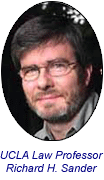



UCLA Law Professor Richard Sander Launching New Assault Against Affirmative Action in Law School Admissions
 In 2004 Richard H. Sander, a professor at the UCLA School of Law, published an article in the Stanford Law Review stating that affirmative action admissions programs at the nation’s high-ranking law schools were placing blacks in schools at which they could not compete with their white peers.
In 2004 Richard H. Sander, a professor at the UCLA School of Law, published an article in the Stanford Law Review stating that affirmative action admissions programs at the nation’s high-ranking law schools were placing blacks in schools at which they could not compete with their white peers.
JBHE research determined that the Sander thesis did not hold water. Our data, obtained directly from law school deans, showed that black students at the nation’s leading law schools graduated at a very high percentage rate, and in most cases had graduation rates equal to or very near the graduation rate of white students.
An independent analysis disputing the Sander study can be read by clicking here.
Now, Sander is attempting to add further fuel to the fire. Sander is heading the Scale and Effect of Admissions Preferences in Higher Education (SEAPHE) project. The group has submitted Freedom of Information Act requests to about 80 public law schools and 100 undergraduate colleges and universities. Sander is collecting information by race on student scores on the Law School Admission Test, the caliber of law school at which students are accepted, and the extent to which law schools offer racial preferences to applicants. He also seeks information on students’ grade point averages once they are in law school and on law school retention and graduation rates.
Professor Sander is also planning to file a lawsuit seeking data from the California Bar Association on how students who were accepted to law school under affirmative action guidelines performed on the state bar examination.
Sander’s group hopes to conduct 18 different studies over the next year and to present their findings at a symposium sometime in 2009.
In view of JBHE’s data, it is unfortunate and damaging to law school-bound black students that new efforts are being made to use data to download high-performing black students into second- and third-tier law schools.
![]()
Copyright © 2008. The Journal of Blacks in Higher Education. All rights reserved.